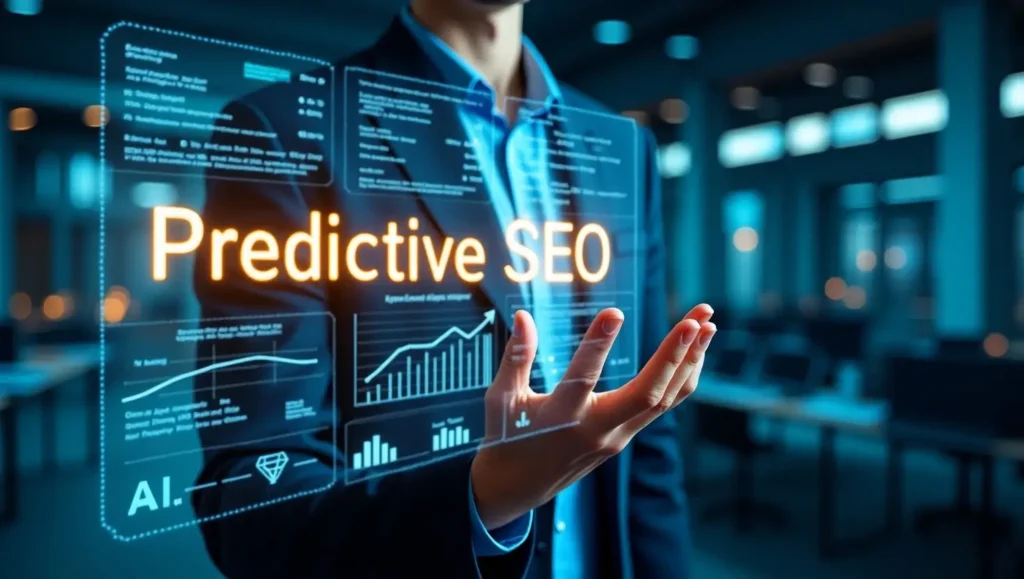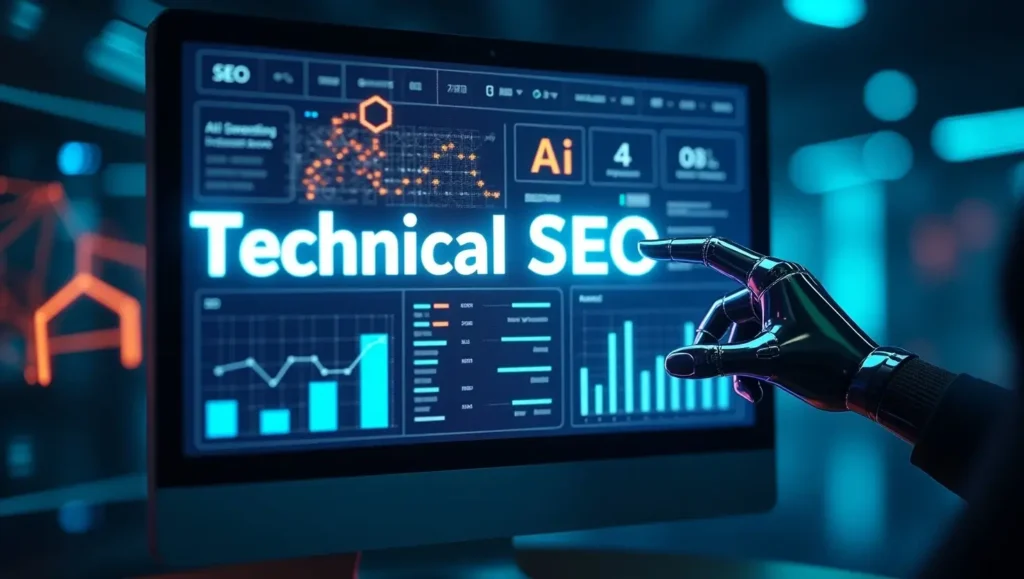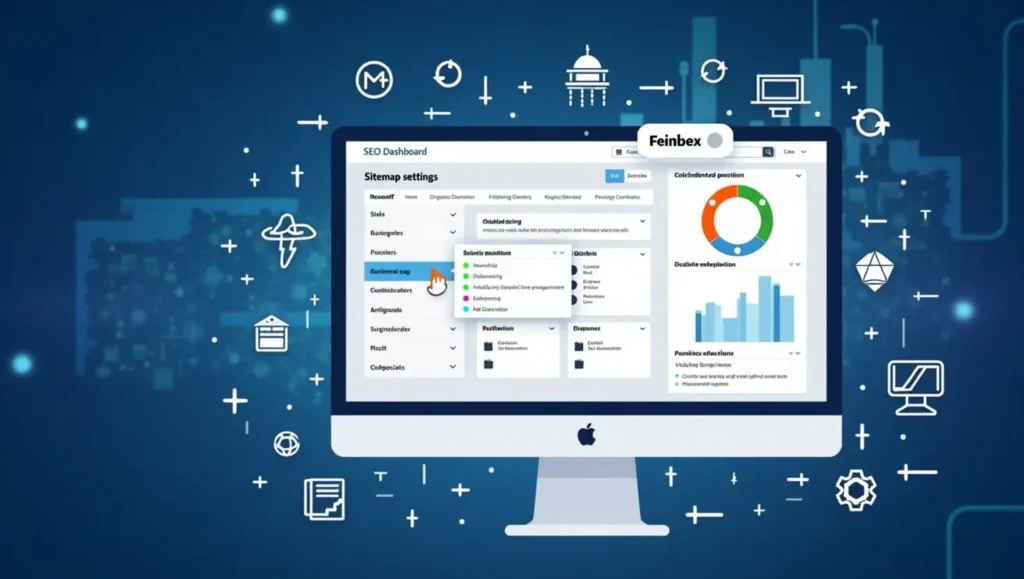As search engines evolve, so do the strategies needed to optimize websites effectively. Traditional SEO tactics no longer suffice in an era dominated by artificial intelligence (AI). AI-driven algorithms, such as Google’s RankBrain and BERT, are reshaping how content is ranked, making technical SEO more crucial than ever. For a broader understanding of how AI is transforming SEO, check out 7 Powerful Features of AI-Powered SEO Tools and Their Game-Changing Benefits.
This blog explores how AI enhances technical SEO, offering actionable insights and best practices to optimize for search engines efficiently. As part of the broader theme of scaling agile SEO solutions with AI, businesses are increasingly leveraging AI SEO tools to scale agile solutions for automation and efficiency. We will discuss how automation, machine learning, and data-driven insights contribute to better website performance and visibility.
Table of Contents
ToggleThe Role of AI in Technical SEO
1. AI-Driven Crawling and Indexing
Search engines rely on AI to crawl and index web pages intelligently. Google’s AI-powered crawlers prioritize relevant, high-quality content while filtering out duplicate or low-value pages. AI helps optimize search engine efficiency, ensuring that the most useful content reaches users quickly.
Actionable Tips:
- Optimize your robots.txt file: Ensure that search engines efficiently crawl your website by blocking unnecessary pages (e.g., admin panels, duplicate content).
- Leverage XML sitemaps: Keep your XML sitemap updated to help search engines discover and index your pages effectively.
- Use structured data (Schema Markup): Implement schema markup to help search engines understand your content better, improving search visibility and technical SEO.
2. Core Web Vitals and AI-Based Performance Optimization
Core Web Vitals (Largest Contentful Paint, First Input Delay, Cumulative Layout Shift) have become ranking factors. AI-powered tools like Google’s PageSpeed Insights and Cloudflare’s AI-driven caching optimize website performance by detecting slow-loading elements and providing solutions.
Actionable Tips:
- Minimize page load time: Use AI-based image compression (e.g., TinyPNG) and lazy loading for media files.
- Improve mobile usability: Utilize AI-driven testing tools like Google’s Mobile-Friendly Test.
- Optimize JavaScript rendering: Reduce render-blocking scripts and use asynchronous loading for better technical SEO results.
3. AI-Powered Log File Analysis
Log file analysis helps in understanding how search engines interact with a site. AI-driven log analyzers identify crawling inefficiencies, uncover orphan pages, and detect crawl budget wastage. AI-based log file analysis reveals crawl inefficiencies and helps improve indexing.
Real-Life Example:
A leading e-commerce website used AI-based log file analysis to identify and fix an issue where search engine bots were crawling thousands of unnecessary filter pages. By implementing better URL parameters and canonical tags, they improved their crawl efficiency and organic traffic by 20% , demonstrating the power of technical SEO.
4. AI for Advanced Keyword Clustering and Topic Modeling
Keyword clustering powered by AI helps group semantically related terms, improving content relevance. Natural language processing (NLP) tools analyze search intent and create topic clusters, enabling a smarter approach to keyword optimization. Keyword clustering powered by AI ensures content relevance and keyword placement.
Actionable Tips:
- Use AI-powered keyword research tools: Leverage platforms like Clearscope or SurferSEO to identify topic relevance and related terms.
- Implement content silos: Organize your website structure using pillar pages and internal linking to reinforce topical authority.
- Utilize AI-generated content insights: AI tools can suggest better keyword placement and keyword variations to enhance technical SEO performance.
5. AI and SEO Automation for Site Audits
SEO audits can be time-consuming. AI-driven tools such as Screaming Frog, Ahrefs, and SEMrush automate audits, detecting broken links, duplicate content, and missing metadata, thereby saving time and improving technical SEO efficiency. For more on automating SEO tasks, check out AI SEO Automation: Top Scaling Solutions to Dominate 2025.
Expert Insight:
“AI allows us to conduct technical SEO audits at scale, identifying issues in real-time and prioritizing fixes that have the highest impact on rankings.” – Marie Haynes, SEO Consultant.
6. AI and Predictive SEO for Trend Analysis
AI predicts search trends by analyzing historical data, social signals, and competitor movements. Predictive analytics help SEOs craft content that aligns with future search demand, allowing businesses to stay ahead of the competition. For more on AI-driven predictive strategies, read 6 predictive SEO strategies using AI to dominate future rankings.
Example:
A digital marketing agency used AI-driven predictive SEO to forecast trending topics in the finance sector. By publishing content ahead of the competition, they secured top rankings and increased traffic by 35%.

7. AI and Natural Language Processing (NLP) for Content Optimization
Search engines now prioritize natural language understanding (NLU) and user intent over simple keyword matching. AI-powered NLP tools analyze text structure, sentiment, and relevance to ensure content aligns with search intent. For more on AI-driven content creation, read Master AI Content and Agile SEO in 2025: The Game-Changing Formula.
Actionable Tips:
- Use AI-based content tools like Grammarly and Hemingway Editor to improve readability and engagement.
- Leverage AI for meta tag optimization, ensuring that descriptions and title tags align with user queries.
- Analyze user intent with AI-driven search query analysis tools, such as Google’s Natural Language API , for better technical SEO.
8. AI in Voice Search and Conversational AI Optimization
With the rise of voice search and virtual assistants like Siri, Alexa, and Google Assistant, optimizing for voice queries is becoming crucial. AI-driven conversational analysis helps in creating content that matches voice search patterns.
Real-Life Example:
A hospitality brand optimized their FAQ section using AI-generated conversational phrases, resulting in a 40% increase in voice search traffic.
9. AI for Link Building and Backlink Analysis
AI tools such as Majestic, Linkody, and Moz analyze backlink quality, detect toxic links, and suggest high-authority linking opportunities. AI-driven outreach automation also helps streamline link-building campaigns.AI tools analyze backlinks and competitor strategies, helping businesses build high-authority links.
Actionable Tips:
- Use AI to identify authoritative sites for backlinks.
- Detect and disavow toxic backlinks using AI-powered tools.
- Automate outreach and guest posting opportunities with AI-generated personalization.

10. AI and Multilingual SEO for International Expansion
AI assists businesses in scaling their global presence by enabling real-time language translation, local keyword optimization, and cultural relevance analysis. For more on AI-driven SEO strategies, explore Unlock 10X SEO Growth: How AI-Powered Analytics is Changing the Game.
Example:
A travel website used AI-powered multilingual SEO tools to optimize content for different regions, resulting in a 50% increase in organic traffic from international users.
Conclusion
AI is revolutionizing technical SEO by enhancing crawling efficiency, improving page performance, automating audits, and enabling predictive search insights. By integrating AI-powered solutions, businesses can scale their technical SEO strategies in an agile and data-driven manner. For more on AI-driven SEO tools, check out Top 7 AI SEO Tools for Scaling Agile Solutions Like an Expert.
Key Takeaways:
- Optimize for AI-driven crawling by using structured data and XML sitemaps.
- Improve site speed and Core Web Vitals with AI-powered performance tools.
- Use AI for log file analysis to enhance crawl efficiency.
- Leverage AI-based keyword clustering and content organization for better search intent alignment.
- Automate site audits and trend analysis with AI-driven tools.
- Optimize for voice search and conversational AI to enhance visibility.
- Implement AI-driven multilingual SEO strategies for international reach.
As AI continues to evolve, how will you adapt your technical SEO strategy to stay ahead? Share your thoughts in the comments below!
FAQs
1. How does AI impact Technical SEO?
AI enhances Technical SEO by improving crawling, indexing, keyword analysis, and predictive search insights. It helps automate SEO audits, optimize content relevance, and refine search intent understanding.
2. What AI tools are best for Technical SEO optimization?
Some of the best AI-powered SEO tools include Google RankBrain, SEMrush, Ahrefs, Screaming Frog, Clearscope, SurferSEO, and Google’s Natural Language API. These tools assist in automation, performance analysis, and content optimization.
3. How does AI help with keyword research and clustering?
AI-driven Natural Language Processing (NLP) groups semantically related keywords, improving content structure. Tools like SurferSEO and Clearscope analyze search intent and suggest keyword variations for better rankings.
4. What is the role of AI in SEO automation?
AI automates repetitive SEO tasks like site audits, metadata optimization, internal linking, and backlink analysis, making the process faster and more efficient.
5. Can AI improve Core Web Vitals?
Yes, AI-powered tools like PageSpeed Insights, Cloudflare’s AI caching, and TinyPNG help optimize Largest Contentful Paint (LCP), First Input Delay (FID), and Cumulative Layout Shift (CLS), leading to better user experience and rankings.
6. How does AI influence voice search optimization?
AI analyzes natural language patterns to optimize content for voice queries, making it more conversational and relevant for virtual assistants like Alexa, Siri, and Google Assistant.
7. What is AI-powered Predictive SEO?
Predictive SEO uses AI to analyze historical search trends, competitor data, and social signals to forecast upcoming search trends, helping businesses stay ahead with proactive content strategies.
8. How does AI help with multilingual SEO for global reach?
AI-powered tools like Google Translate AI, DeepL, and Weglot assist in real-time translation, local keyword optimization, and cultural relevance analysis, making it easier to scale SEO efforts internationally.



